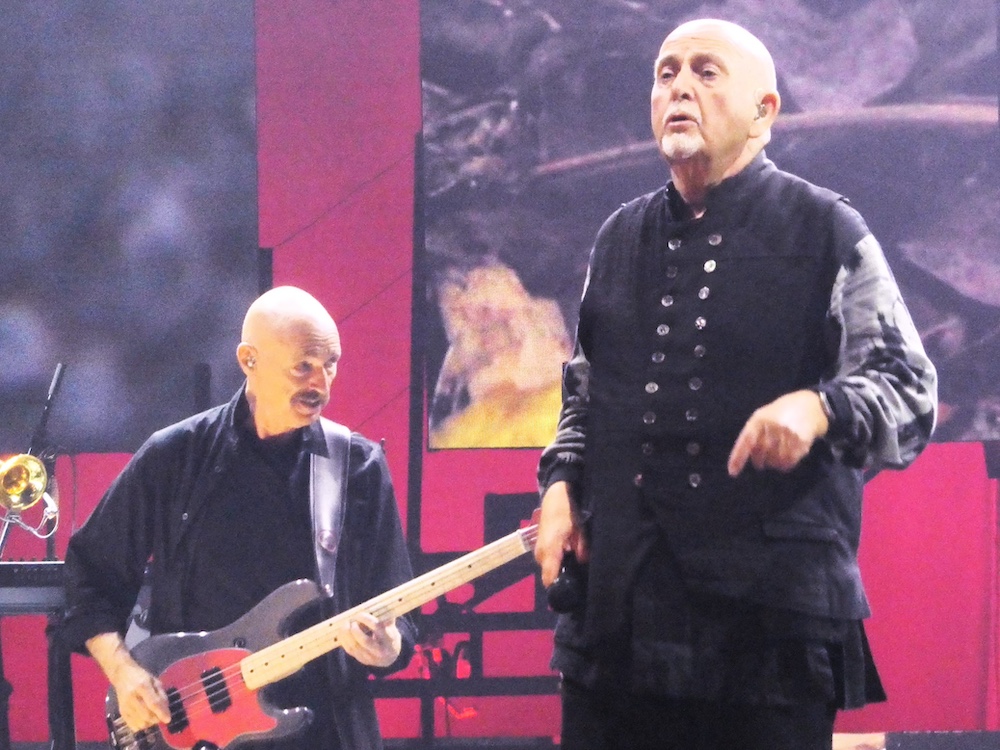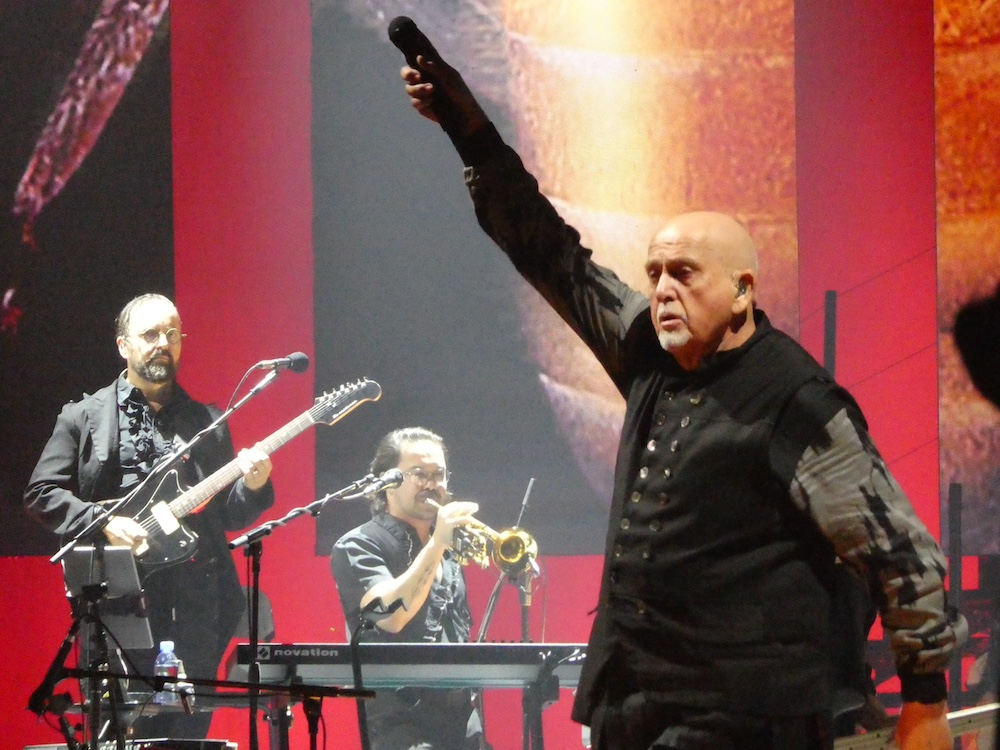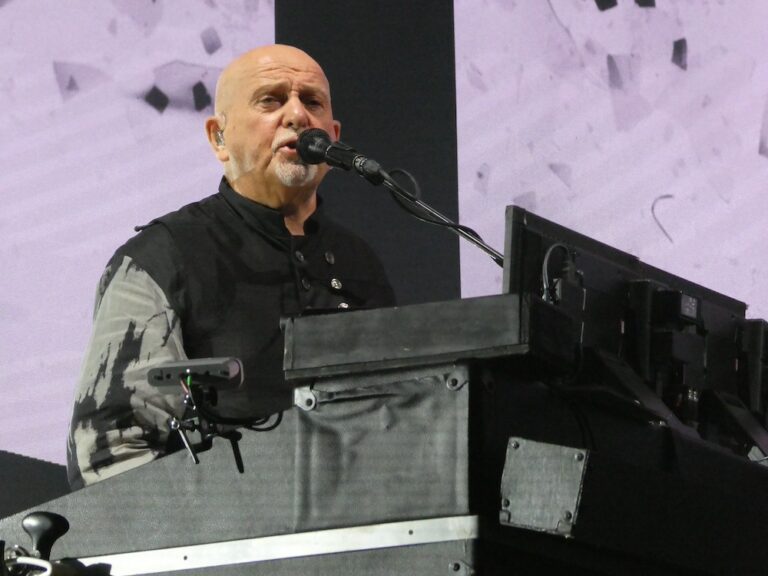In the early, floundering days of his first professional band, the progressive rock Genesis, Peter Gabriel began experimenting with costumes and props during concerts. Photographs of the previously-undiscovered band suddenly appeared in local newspapers. With this new attention, the British band finally began climbing the ladder of success.
By the mid-1970s, the band was headlining theaters. The public attention was almost exclusively on Gabriel, however, to the exclusion of the other musicians. Internal tensions within the band led to Peter Gabriel exiting. It turned out to be a financially lucrative move, as both Gabriel and Genesis achieved greater commercial success after their parting of ways in 1975.
In the late 1970s and early 1980s, Gabriel enjoyed moderate success as a solo artist with “Solsbury Hill,” “Games without Frontiers,” and “Shock the Monkey.” In 1986, the video for “Sledgehammer” from his fifth solo album, So, won a record nine MTV Awards at the 1987 MTV Video Music Awards and, according to a report in 2011, it was MTV’s most played music video of all time. So is Gabriel’s most commercially successful album, selling five million copies in America.
Gabriel has maintained a much lower profile in the 21st centur; his most recent studio album of new material was released in 2002. The next album, entitled i/o, has no official release date. Since January, Gabriel has been releasing one song from the forthcoming album each month on the full moon. He began a tour promoting the i/o album in Europe in May before coming to America.
Gabriel presented his nearly three-hour concert at Madison Square Garden on September 18 in two parts separated by an intermission. The first half was mostly all new songs, leaving the majority of his better-known songs for the second half. Gabriel and his band performed 11 of the 12 songs from the forthcoming album. (The evening’s repertoire did not include Genesis songs, “Games without Frontiers,” nor “Shock the Monkey.”)

The night began unceremoniously, with Gabriel appearing onstage alone for a lengthy monologue accompanied by slowly moving projections on a screen above and behind him. Like a professor teaching the audience in lecture mode, he spoke about time, which “has every single one of us in its claws,” and imagination, which “helps us escape,” concluding that artificial intelligence leads to an increasing difficulty in “telling the real from the fake.” This would not be a traditional concert.
Under a massive projection of Earth’s moon, Gabriel introduced his longtime bassist, Tony Levin. With Gabriel cradling a small keyboard on his lap, the pair sat and performed a bare-boned rendition of 1992’s lullaby “Washing of the Water.” One by one, Gabriel’s musicians joined the seated campfire-style semicircle. Drummer Manu Katché and guitarist David Rhodes joined for a re-envisioned version of 2002’s “Growing Up.” Cellist/keyboardist Ayanna Witter-Johnson, guitarist/flautist Richard Evans, violinist/viola player Marina Moore, keyboardist Don McLean, and horn player/keyboardist Josh Shpak joined, all playing acoustic instruments.
The musicians moved to more traditional stations by the third song. The set continued with six songs from the forthcoming album, plus 1992’s “Digging in the Dirt” performed midway and “Sledgehammer” leading into intermission. Aside from those two songs, the tempos were mostly slow and the tone was soft.
After a 20-minute intermission, the musicians returned behind a large nine-panel scrim along the edge of the stage. As they played “Darkness” from the Up album, one panel displayed Gabriel’s shadow as the other screens echoed his movements in sequence. The final 11 songs were a mix of old and new. Gabriel sang “Don’t Give Up” as a duet with his cellist, Ayanna Witter-Johnson, who sang the part that Kate Bush sang on the original recording. “Big Time” and his solo-career-starting “Solsbury Hill” also were highlights of the second set.
For the encore, Gabriel performed “In Your Eyes,” which was featured in a key scene in the 1989 film Say Anything…, where the main character held high a boombox playing the song; Gabriel held an inflatable toy boombox as he sang the song. The singer then thanked former U.S. President Jimmy Carter for his humanitarian work, asking the audience to sing “Happy Birthday to You” as a tribute in advance of Carter’s 99th birthday. This led into the show closer, the anti-apartheid “Biko” from 1980, as images of Theodore Biko appeared on the overhead screens.
Gabriel frequently offered thanks throughout the program. He showed appreciation to the audience, he name-checked his musicians repeatedly, he mentioned the names of the artists whose visuals appeared on the screens and, during the encore, he asked the audience to join him in thanking his crew. Indeed, such a creative production took many imaginative minds, hard-working hands, and faithful fans who remained faithful even after two decades of relative silence from the musician.

Setlist
Set 1:
- Washing of the Water (acoustic)
- Growing Up (acoustic)
- Panopticom
- Four Kinds of Horses
- i/o
- Digging in the Dirt
- Playing for Time
- Olive Tree
- This Is Home
- Sledgehammer
Set 2:
- Darkness
- Love Can Heal
- Road to Joy
- Don’t Give Up
- The Court
- Red Rain
- And Still
- Big Time
- Live and Let Live
- Solsbury Hill
Encore
- In Your Eyes (Peter asks for a “Thank You” to tour crew when the song concludes)
- Biko



